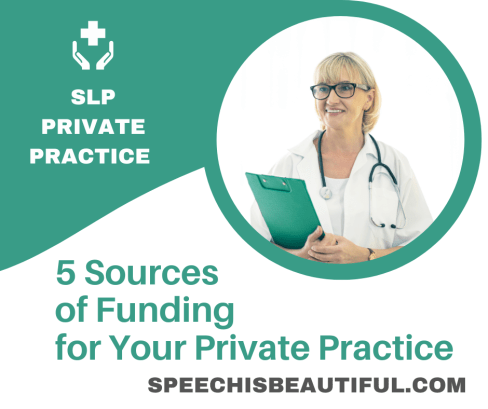
Do you ever dream of starting your own speech therapy practice or speech clinic? Would you like to have a side business or part-time private practice? Do you think that it requires a large amount of capital that you may not have? There are sources of funding available for people looking to start their own gig. But what would you need money for? Depending on what you might require to get going, you may need cash for:
5 Costs to Plan for in Your SLP Private Practice
- Speech therapy materials – Hopefully you have accumulated your own stash of materials over several years, but you might need a little boost to be fully ready-to-go.
- Speech assessments and evaluation protocols – Speech tests are very expensive, ranging from $100 to $500 and don’t forget that packages of protocols range from $25 to $80. Luckily, the tests are a one-time expense.
- Cost of rent of a space or transportation to home-based sites – Consider obtaining a therapy space. Make calls around your neighborhood to see what spaces are going for. It may make sense to put off spending rent on a space until you have a large caseload. Rent is a costly reoccurring expense. Consider home-based clients and traveling to them.
- Office supply costs – Folders, lockable file cabinets, a desk, tables, chairs, and bookshelves are just a few of the things you will need to start your own private practice. Again, your need depends on whether or not you jump into your own office or your start a home-based practice (for example, through Early Intervention or Home Health).
Costs can add up. Run the numbers so that you have a rough idea of your total cost. Many funding sources are available; however, keep in mind that risk is a concern with any loan:
7 Sources of Funding for Your SLP Private Practice
- Bank or Credit Union Loan – Your personal bank has a good idea of your credit-worthiness and will most likely offer you a loan.
- Small Business Loans – The Small Business Administration (SBA) has resources for small business owners.
- Home equity loan – If you own your home, a home equity loan might be a way to obtain startup money. However, your house can be taken away if you default on the loan.
- Credit cards – Credit cards are probably the most popular way that small business owners obtain the funds for their business at the beginning. However, interest rates are often high so do your homework on your cards.
- Family members – Reaching out to supportive family is a great way to get money and pay little to no interest. There may be different kinds of “strings attached” to family money, though.
- Withdrawal from 401k or 403b – If you have been putting money into a 401k or 403b for your retirement, you may be able to withdraw from it. However, there are penalties at the time of withdrawal and it will be taxed as income at the end of the tax year.
- Tax return – A fat tax return can be a terrific infusion of cash into a small business.
I hope my suggestions are helpful to you. Did I miss anything? Please comment below or send me an email. Thanks!
Learn more here: 5 Easy Private Practice Tips